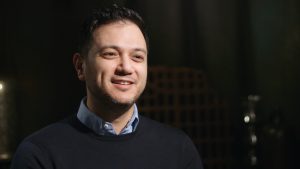Nicholas Phan: Forging Connection
Description
Award-winning tenor Nicholas Phan explores the world in song, merging cultures while uncovering immense value in all of our differences.
Featured Artists

Nicholas Phan is an internationally celebrated lyric tenor who has performed with many of the world’s leading orchestras and operas. He has received three Grammy nominations.
Phan was raised in Ann Arbor, MI, by a Greek American mother and a Chinese-Indonesian father. Known as a preeminent singer of opera and vocal chamber music, he has performed with the Cleveland Orchestra, New York Philharmonic, Boston Symphony, Chicago Symphony, and Philadelphia Orchestra, among others, and toured the major concert halls of Europe and North America. He has released five solo recordings. His two albums of Benjamin Britten songs established Phan as a leading interpreter of the British composer. His compilations Gods & Monsters (2017) and Clairières: Songs by Lili & Nadia Boulanger (2020) were nominated for Grammy Awards.
In 2010 he co-founded the Collaborative Arts Institute of Chicago to promote art song and vocal chamber music. He serves as artistic director of that organization and teaches music at DePaul University.
Transcript
When the philosopher and historian Hans Kohn recorded this rosy sentiment in his 1944 book, The Idea of Nationalism, two world wars had already proven that conflating one’s birthplace with one’s identity was a powerfully double-edged sword. After the Great War and the dissolution of the Austro-Hungarian Empire, national borders throughout Europe were redrawn along more culturally cohesive lines, thus giving smaller ethnic groups greater autonomy over their own affairs.
Nicholas Phan: Inherent in freedom is chaos, and inherent in defining oneself, one has to define the Other. Ultimately, I think the greatest naivete about it is this idea that anybody is just one thing.
The internationally celebrated lyric tenor Nicholas Phan has just completed an exploration of the role of the art song defining national identity. But even before this, he had already struggled to balance the different parts of his own identity. Phan grew up in Ann Arbor, Michigan in the 1980s to a second-generation Greek-American mother and a father who was born in China. Both were deeply connected to their cultures of origin. As a result, the young Phan felt alienated from the place where he grew up. It all came to a head in 2003, when a 24-year-old Phan entered the BBC Singer of the World competition.
Phan: I always describe it to people as Miss Universe for voice and opera.
Competitors were asked to bring songs from their home countries. But while the other singers easily embraced this directive, Phan faltered.
Phan: I didn’t feel American enough. And I was afraid of appropriating something that wasn’t mine.
AJC: What did you end up singing, and what would you sing today, were the circumstances to be presented to you again?
Phan: What I ended up singing were some songs by John Musto that were settings of Langston Hughes’s poems. I think, in the end, I probably would’ve chosen “At the River” by Aaron Copland, but I did not have that courage, at that time.
A decade later, the question of who is entitled to what national identity came up for Phan once again. His first two albums were of music by the great 20th-century British composer Benjamin Britten. Both were well-received, in part because of Phan’s outsider perspective.
Phan: The thing about the experience was, I thought, revelatory to me because it actually showed me that, oh, I can have that courage. But for some reason, because that was Other, that felt safe. I can have the same courage with my own music, with American music, and so, in this roundabout way, I feel that I have found my own courage to perform our music, by going through these European composers, and having the boldness to interpret their music, as well.
Today, Nicholas Phan is a bold explorer of far-ranging musical traditions. He believes that music should invite outsiders in, and act as a reminder of the things that we all share. His most recent project examined how music, specifically the art song, has been used as both a hammer and a mirror, forging and reflecting national identities across time. He looked first to France during its Belle Epoque. This was a golden age of prosperity, productivity, and peace that began in 1871 in the wake of the Franco-Prussian War.
Phan: They are trying to define a French aesthetic in response to this Austro-German thing that dominates Europe at the time. And so you have this hotbed of intellectual and artistic activity happening, and out of it is born this French nationalist movement in art. And most specifically, in poetry and in music.
For the early part of the 1900s, creativity flourished, especially around Paris. But everything changed in 1914. The Great War devastated the entire nation. Hardly anyone survived without scars, physical or emotional. But from the rubble emerged some of the most remarkable works of culture of modern times. Phan sees this as a natural reaction to great loss.
Phan: It destroyed families. It’s a traumatic event, I think, on so many levels, and one of the ways we, as humans, try and grapple with such large concepts, is through art. It’s how we come together, it’s how we express our emotions.
AJC: And how we feel, collectively.
Phan: Yeah.
Without borders, Nicholas Phan explores the musical territories that captivate him, and in doing so, reminds us of what we all share.

